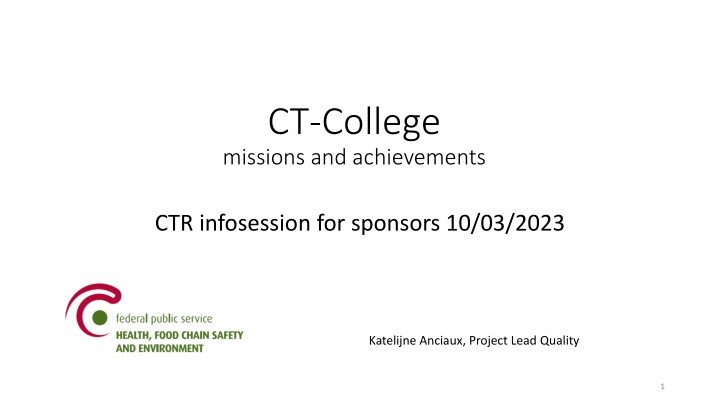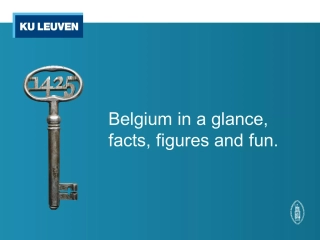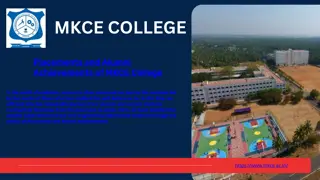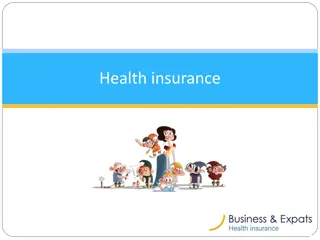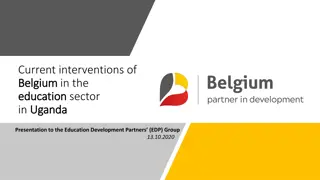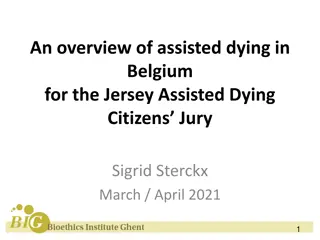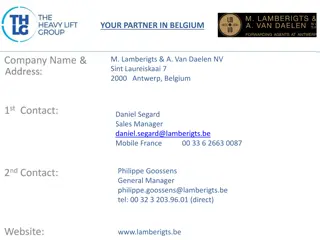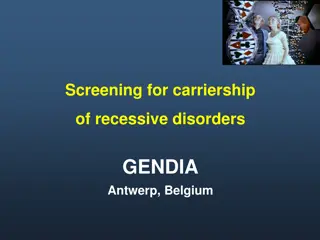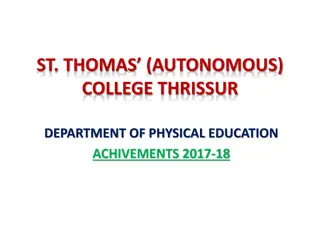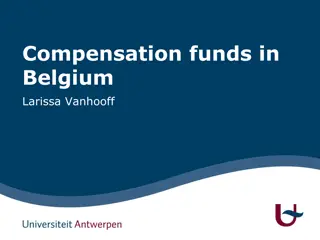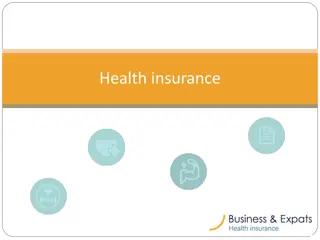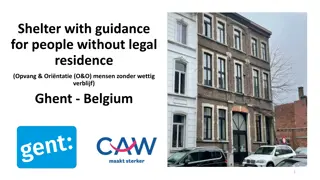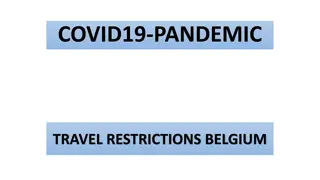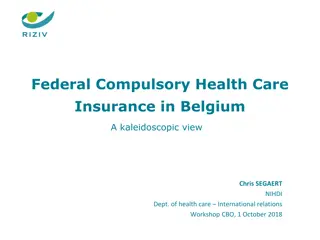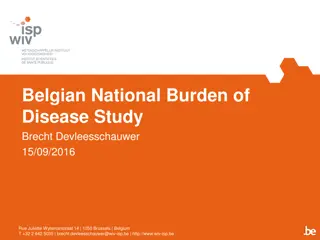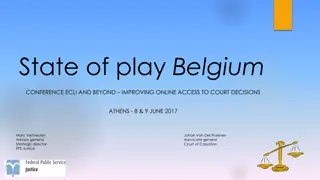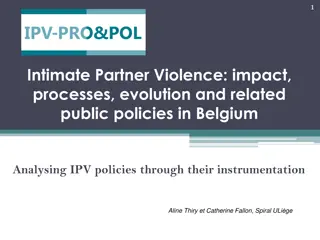Implementation of EU Regulations in Belgium by CT-College: Achievements and Structure
CT-College discusses its successful implementation of EU regulations in Belgium, highlighting achievements, mission, regulatory framework, and College structure. Key topics include the College Board's representation in EU groups, Belgian legislation, number of applications in 2022, and the College's role in implementing CTR, MDR, and IVDR. Details on the College's establishment, composition, and collaboration with FAMHP are also provided.
Download Presentation

Please find below an Image/Link to download the presentation.
The content on the website is provided AS IS for your information and personal use only. It may not be sold, licensed, or shared on other websites without obtaining consent from the author.If you encounter any issues during the download, it is possible that the publisher has removed the file from their server.
You are allowed to download the files provided on this website for personal or commercial use, subject to the condition that they are used lawfully. All files are the property of their respective owners.
The content on the website is provided AS IS for your information and personal use only. It may not be sold, licensed, or shared on other websites without obtaining consent from the author.
E N D
Presentation Transcript
CT-College missions and achievements CTR infosession for sponsors 10/03/2023 Katelijne Anciaux, Project Lead Quality 1
Outline Competent for 3 EU regulations Implementation of EU regulations in Belgium The College Board, its mission and achievements Representation of College in EU working group 2
Belgian Belgian Legislation Legislation on European CTR on European regulations MDR regulations IVDR Royal Decree 25/09/2022 Royal Decree 18/05/2021 Royal Decree 09/10/2017 National law on medical devices 22/12/2020 National law on in vitro medical devices 15/06/2022 National law on clinical trials 07/05/2017 In vitro diagnostic regulation EU 2017/746 Medical device regulation EU 2017/745 Clinical Trial regulation EU 536/2014 26/05/2022 26/05/2021 31/01/2022 3
Number Number of Applications in 2022 ( of Applications in 2022 (till till Oct Oct) ) CIAs = Clinical Investigation Applications (MDR) CTAs = Clinical Trial Applications (CTR) PSAs = Performance Study Applications (IVDR) 4
Implementation Implementation of CTR, MDR & IVDR in of CTR, MDR & IVDR in Belgium highlights Belgium National contact point (NCP): FAMHP (Law of 7 May 2017, Art. 4; CTR, Art 83) The FAMHP and the Evaluating EC are jointly in charge of the evaluation Reorganisation of the ethics assessment/ECs o Creation of a College o 1 EC involved per assessment
Creation Creation of the of the College College ( (Board Board): ): Ministerial Ministerial Decree Decree Independent College created within the Federal Public Service of Health, Food Chain Safety and Environment. More information: www.ct-college.be The decree defines the mission, organisation, composition of the College and its collaboration with FAMHP and evaluating ECs.
Composition Compositionof of the the College (Board) College (Board) Effective member Substitute member MDs with experience in Phase I trials Lucas Van Bortel, Chairman (NL) Rene Westhovens (NL) Didier Verhoeven (NL) Philip Debruyne (NL) Experts in quality control systems Hilde Nevens, Vice-Chairman (NL) Joline Goossens (NL) Lawyers Bruno Fonteyn (FR) H l ne Garnier (FR) Evelien Delbeke (NL) Moustapha Assahraoui (NL) 7
Mission of Mission of the the College College 1 Single point of contact between FAMHP and ECs 2 Assignment of EC in charge of evaluation of clinical study applications Objective criteria defined by legislation Cannot be the EC of the study site(s) 3 Ensure a consistent application of the law by the ECs. Recommendations to the ECs can be made. 4 Formulate advices on the application of the regulations and legislation 5 Coordinate, harmonise, support, evaluate and follow- up the quality control activities carried out by the ECs. Recommendations to the ECs can be made. 6 Support ECs in the evaluation of applications, 7 Submit annual activity report to Minister and Parliament Law of 7 May 2017, Art. 9. 3 8
Organisation of Organisation of the Rules of internal order: Royal Decree the College College 9
Mission of Mission of the Tasks delegated to admin staff FPS Health the College College 1 Single point of contact between FAMHP and ECs 2 Assignment of EC in charge of evaluation of clinical study applications Objective criteria defined by legislation Cannot be the EC of the study site(s) 3 Ensure a consistent application of the law by the ECs. Not delegated: Recommendations to the ECs can be made 4 Not delegated: Formulate advices on the application of the regulations and legislation 5 Coordinate, harmonise, support, evaluate and follow- up of the quality control activities carried out by the ECs. Not delegated: Recommendations to the ECs can be made 6 Support ECs in the evaluation of applications, 7 Prepare annual activity report for the Minister and Parliament. Law of 7 May 2017, Art. 9. 3 10
Organisation Organisation of Admin staff FPS Health of the the College College Project lead CTR S bastien Vanhiesbecq (FR) Project lead MDR/IVDR Michelle Fonteyne (NL) Project lead Quality Katelijne Anciaux (NL) Project lead IT Julien Frgacic (FR) File managers Marl ne Keck-Antoine (FR) Jean Pirard (FR) Bram Ottenbourgs (NL) Lisa Reyckers (NL) Annelies Marin (NL) Julie Seronvalle (FR) 11
Organisation Organisation of Admin staff FPS Health of the the College College Admin staff organizes : Infosessions for ECs: 3/year Working group meetings with ECs and FAMHP: 1/month CTIS helpdesk sessions for ECs: 1/week College Board meetings 12
Organisation Organisation of College Board meetings and achievements of the the College College - Meetings: monthly in case of urgencies ad hoc meeting or via written consultation Admin staff reports on delegated tasks Discuss questions from ECs, sponsors or admin staff Prepare advices : e.g. - advice to ECs on safety assessment, - advice to Minister on ombudsfunction, Discuss, adapt and/or endorse templates and procedures : e.g. - site suitability statement template, - CV Investigator - procedure for assignment of the EC, - endorsement e-ICF guidance, - Tool for Quality Control by ECs - - - - 13
College Board Site suitability statement Version 3, May 2022, includes the requirement: A copy of the feasibility report[1] by the sponsor comprising study specific requirements is attached to this document. If a feasibility report is not available, a description of the study-specific requirements regarding facilities, equipment and availability of staff should be attached to this document. Reason : to ensure the CEO that signs the document is aware of all the necessary information. The CTR states: N. SUITABILITY OF THE FACILITIES (INFORMATION PER MEMBER STATE CONCERNED) 67. A duly justified written statement on the suitability of the clinical trial sites adapted to the nature and use of the investigational medicinal product and including a description of the suitability of facilities, equipment, human resources and description of expertise, issued by the head of the clinic/institution at the clinical trial site or by some other responsible person, according to the system in the Member State concerned, shall be submitted.
College Board CV Investigator Belgian version June 2022, includes addendum
College Board ICF template private practice When no Data Protection Officer (DPO) is available at the trial site, for example for trials in private practices. Only in that specific case : Who can I contact in case of questions? The Data protection officer of the site can be replaced by the Principal Investigator that will take on the role of DPO.
College Board ICF template private practice When no patient rights ombudsman is available at the trial site, for example for trials in private practices. Who can I contact in case of questions? Board s proposal: No independent entity currently has the (legal) competence to fulfil this role This role could be taken by The Federal Ombudsman Service for Patients' Rights Lack in legislation The Minister is informed of this proposal (letter to Minister dd 29/04/2022)
College Board ICF template private practice Temporarily: When no patient rights ombudsman is available at the trial site, for example for trials in private practices. Only in that specific case : Who can I contact in case of questions? The patient rights ombudsman can be replaced by the FAMHP or the CT-College depending on the type of trial: Applications approved via a pathway or procedure where the CT-College is involved: The patient rights ombudsman can be replaced by Clinical Trial College Applications approved via a pathway or procedure where the CT-College is not involved: The patient rights ombudsman can be replaced by Federal Agency for medicines and health products (FAMHP) e-mail: ct.college@health.fgov.be e-mail: inspection @fagg-afmps.be
College Board assignment of the EC Legal Criteria 1) 2) 3) 4) 5) 6) The EC must be currently recognized under the law of 07/05/2017 The EC doesn t have any quality issue In case of Phase 1 CTA : the EC is recognized for phase I trials In case of appeal : the EC that already assessed the dossier is excluded The EC is independent of all the sites involved in the study and of the sponsor The EC expertise domain(s) matche(s) the therapeutic domain(s) of the study 7) Is there any connection between the study application with a former one: e.g. in case of a Resubmission SM or a subsequent addition of a MSC Extension study Initial (part II) or a subsequent addition of Belgium (part II) for staggered submissions 20
College Board assignment of the EC Additional Criteria Language of ICFs Sister studies: CTAs submitted simultaneously which are very similar trial, i.e. same IMP and very similar protocol and ICFs. Combo studies: e.g. IMP combined with Medical Device or In vitro Diagnostic Medical Device 21
College Board Guidance e-ICF, update New version v2.0 (June 2022) available at www.ct-college.be
College Board generic publicity Generic publicity is publicity that is in no means referring to a specific clinical trial (also not via a QR code, or URL). Do you need an advice from an EC? No legal base to need an EC advice, the College Board highly recommends to obtain the approval from an EC. If a database of healthy volunteers is prepared: the legal base for this is the GDPR. Hospitals may require an EC advice. 23
Outline Competent for 3 EU regulations Implementation of EU regulations in Belgium The College Board, its mission and acchievements Representation of College in EU working group 24
CT CTE EG Clinical Trial Expert Group G Clinical Trial Expert Group Exists since 2006 No legal base, informal Reps from NCA & Ethics Pre-CTR: advises the Commission with the preparation for the CTR implementation (a.o. drafting of the CTR Q&A) Since CTR: CTEG serves as a forum to national experts to discuss technical regulatory issues on clinical trials on medicinal products for human use. CTEG supports the Commission and the Clinical Trials Coordination and Advisory Group (CTAG) with the implementation of the CTR and its implementing acts. Frequency of meetings: 3 times / year (+ subgroup meetings) https://ec.europa.eu/transparency/expert-groups-register/screen/expert- groups/consult?lang=en&do=groupDetail.groupDetail&groupID=1464&NewSearch=1&NewSearch=1 25
CT CTE EG G activities activities, , examples examples CTR Q&A EU Part II templates developped by a sub-group (ethics reps): CV & DOI Investigator Compensation for trial participants Site suitability (BE uses own template: adapted & endorsed by the College) Recruitment and Informed consent procedure Collection, storage and future use of human biological samples Naming convention for CTIS Recommendation on Decentralized elements in CTs https://ec.europa.eu/health/medicinal-products/eudralex/eudralex-volume-10_en#set-of-documents-applicable-to-clinical-trials- authorised-under-regulation-eu-no-5362014 26
CT CTE EG G activities activities, , examples examples CTR Q&A 1.24 : Where to submit documents that are given to a patient? Part I, patient facing documents Part II, Recruitment material and subject information sheets Documents given to a participant before their decision to participate or abstain from participation in the CT CTIS Section Recruitment arrangements, subject information and informed consent Documents given to a participant during the conduct of the CT, linked to the endpoints of a CT CTIS Section Protocol 27
CTEG CTEG activities activities, , examples examples CTR Q&A 1.24: In which language to submit documents that are given to a patient? Part I, patient facing documents Part II, Recruitment material and subject information sheets To be submitted at least in the official national language(s) of the region(s) where the trial is conducted. (List of documents FAMHP website) To be submitted at least in the official national language(s) of the region(s) where the trial is conducted. EN is optional (cfr CTR Q&A Annex II) 28
CT CTE EG G activities activities, , examples examples Biological samples template - Part II template - Template to be used by Sponsors to provide information about compliance with use of biological samples" (Regulation (EU) No 536/2014, Article 7.1 (h)). - Developed in collaboration with the BAREC WG on Biological samples 29
CT CTE EG G activities activities, , examples examples Naming convention proposed by CTCG Link to CTCG document Highly recommended! 30
CT CTE EG G activities activities, , examples examples Please ensure that namings are consistent and meaningful 31
CT CTE EG G activities activities, , examples examples Patient facing documents, please also include language (e.g. nl, en, fr, ) 32
EU project on EU project on Decentralized Decentralized Clinical Trials Clinical Trials Started by CTCG in feb 2021 Re-started as a project in april 2022 Goal: develop paper with Recommendations on decentralised elements in CTs Lead by project managers from DK & SE Representatives from Ethics (CTEG, ECs), NCAs (CTCG), GCP-IWG, EMA, Collected feedback from other stakeholders (patients, sponsors, CROs, HCPs) via workshop Published in december 2022: Recommendation paper on decentralised elements in clinical trials (europa.eu) GCP-IWG: GCP inspectors working group, EMA 33
CT CTE EG G activities activities, in , in the the future future CTR / IVDR combotrials - The Commission received the feedback from sponsors about the difficulties of interaction between CTR and IVDR, generating delays for the conduct of clinical trials in Europe, notably for combination products. (Still to be discussed in the future.) - Frequent remark from Belgian ECs: ICFs can be the same for CTA and PSA IMPORTANT: the patient should be informed in the ICF that an Investigational in vitro diagnostic is used 34
Thank Thank you you 35
